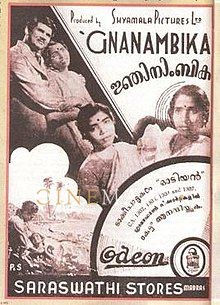This section is for paid subscribers only. Our subscription is only $3700/- for one full year.
You get unlimited access to all paid section and features on the website with this subscription.
Subscribe to read full article
This section is for paid subscribers only. Our subscription is only $37/- for one full year.
You get unlimited access to all paid section and features on the website with this subscription.
Not ready for a full subscription?
You can access this article for $2, and have it saved to your account for one year.
- Release Date7/04/1940
- FormatB-W
- LanguageMalayalam
- Run Time190 min
Gnanambika is the daughter of a wealthy landlord, Rajasekharan. After the death of her mother, her father marries again. Rajamani, the villainous second wife, tortures Gnanambika, forcing her to run away from home. Rajamani, with the help of her secret lover Sreekumar, plots to appropriate the wealth of the good-natured Rajasekharan.
Rajasekharan decides to marry Gnanambika to Raveendran, the chivalrous hero of the film. To get her hands on Rajasekharan’s wealth, Rajamani tries to sabotage the wedding of Gnanambika and Raveendran. But her secret lover abandons her and falls in love with Indumukhi. Rajamani sells Gnanambika to a zamindar in the absence of Rajasekharan. She informs him that Gnanambika has eloped with Raveendran. Though Rajamani arranges for goons to kill Rajasekharan, Raveendran comes to his rescue. Rajamani’s schemes fall apart and her plans are revealed. The film ends with the wedding of the two couples, Gnanambika and Raveendran and Sreekumar and Indumukhi.
It was with Gnanambika that the concept of antihero came into Malayalam films. Gnanambika was the first box-office hit in Malayalam. The film, shot extensively outdoors at locations in Thiruvanathapuram and Thripunithura, was a new experience for the audience. The film included fifteen songs composed by T.K. Jayaram Iyer. Of these, Katha ithu kelkan, sahajare vaa, sung by Sebastian Kunju Kunju Bhagavathar, became very popular. It was an imitation of the K.L. Saigal–Kanan Devi duet Ghunghuruva baaje chhama chhama chham from the film Street Singer (1938).

Cast
Crew
-
BannerShyamala Picture
-
Director
-
Producer
-
Music Director
-
Lyricist
-
Dialogues
-
Cinematography
-
Writer






.jpg)

.jpg)



